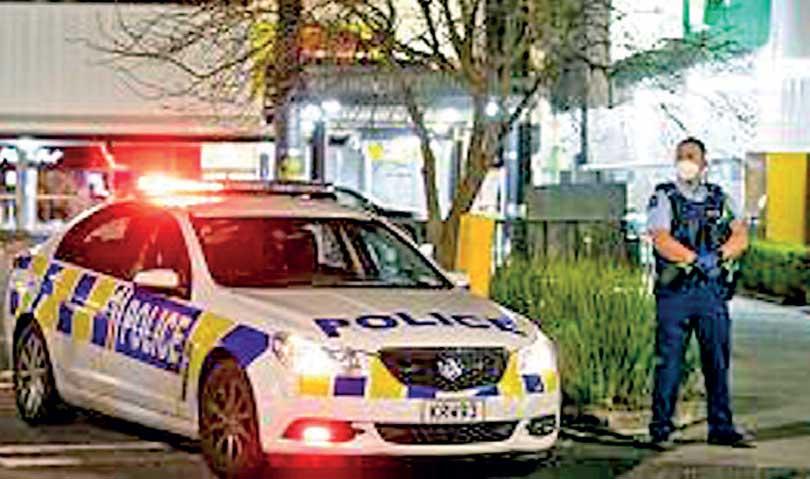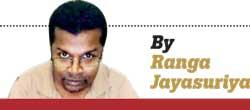07 Sep 2021 - {{hitsCtrl.values.hits}}
 At the scene of crime in Auckland when a knife attacker was gunned down by police
At the scene of crime in Auckland when a knife attacker was gunned down by police
 Ahamed Aadhil Mohamed Samsudeen, Islamic State-inspired Sri Lankan born terrorist who knifed six shoppers in a shopping mall in Auckland last Friday had been awaiting a decision on an appeal against his deportation back to Sri Lanka. In the meanwhile, the authorities in New Zealand, who ‘had been trying to deport himfor years,’ had also been scheming to keep the Sri Lankan authorities in the dark over would-be deportee’s conviction in terror-related offences and involvement with Islamist extremism.
Ahamed Aadhil Mohamed Samsudeen, Islamic State-inspired Sri Lankan born terrorist who knifed six shoppers in a shopping mall in Auckland last Friday had been awaiting a decision on an appeal against his deportation back to Sri Lanka. In the meanwhile, the authorities in New Zealand, who ‘had been trying to deport himfor years,’ had also been scheming to keep the Sri Lankan authorities in the dark over would-be deportee’s conviction in terror-related offences and involvement with Islamist extremism.
A judge issued aname suppression order, effectively prohibiting the publication of information about Samsudeen’s name, address, occupation and any identifying particulars until his refugee status is determined.
 “In the event that Samsudeen’s name and identifying particulars are published, I accept on the materials before me that there is a real and appreciable possibility that, in the event, Samsudeen’s refugee status is revoked and he is deported to Sri Lanka, his safety could be in danger.” Justice Wylie wrote in his judgement.
“In the event that Samsudeen’s name and identifying particulars are published, I accept on the materials before me that there is a real and appreciable possibility that, in the event, Samsudeen’s refugee status is revoked and he is deported to Sri Lanka, his safety could be in danger.” Justice Wylie wrote in his judgement.
He further observed that “the Refugee Status Branch has acknowledged in its notice of intention that the fact of the objectionable material charges (in fact now restricted material charges) may lead authorities in Sri Lanka to undertake their own investigations, which may in turn lead them to material on Samsudeen’s social media accounts. That material might be taken as indicating that Samsudeen has advocated violence and holds militant Islamist views.”
Interestingly, Samsudeen has been found guilty and sentenced to supervised custody for the same offences, distributing restricted material (terrorist propaganda), in New Zealand.
“I accept the submission made that any material published will be readily available on the internet and that it could come to the attention of the authorities in Sri Lanka.”
The Judge also noted that many countries and organizations, including the US Country Report on Human Right Practices in Sri Lanka, Report of the Special Rapporteur on Minority Issues in Sri Lanka and the Human Rights Watch have raised concerns about human rights abuses in Sri Lanka.
The name suppression was to be in effect until Samsudeen’s refugee status is determined. Since the stated objective of the suppression order was to prevent the information of Samsudeen’s conviction in terror-related offences from being available to the Sri Lankan officials, it is unlikely that the order would have been lifted if he were to be deported to Sri Lanka.
In all likelihood, self-righteous busybodies in Wellington were plotting to deport to Sri Lanka a convicted terrorist, passing him off as a failed asylum seeker.
This is a dangerous and treacherous business. More so, when New Zealand authorities have been keeping him under strict surveillance, Jacinda Ardern, the Prime Minister said 30 cops had been watching over our man from Kattankudy for 53 days since he was released from jail in July. One of those officers killed the attacker within 90 seconds he launched into the attack.
New Zealand authorities considered Samsudeen as a credible threat. But, intriguingly they also seemed to have concluded that he is not a threat to Sri Lankans. They prioritized the safety of the terror convict even at the possible expense of natives. They plotted to keep in the dark the Sri Lankan law enforcement so that the deported terrorist would be safe. As it has emerged now, Samsudeen’s previous convictions in terrorism and extent of radicalization would have warranted him being placed in preventive detention on his arrival, if he was to be deported to Sri Lanka. However, in the absence of information sharing by their counterparts in New Zealand, Sri Lankan officials will struggle to build a prima facia case.
Samsudeen would walk free. Instead of in Auckland, he would attack here. Such an eventuality would have devastating consequences not just for life and property, but also for race relations, still reeling from the Easter Sunday attack. However, Samsudeen was in a hurry and we were spared from a calamity. But, this should serve as a lesson for the Sri Lankan authorities to be more circumspect in the future.
This is not the first time a Sri Lankan radicalized abroad could have got away to wreak havoc another day. Abdul Latif Jamil Mohammed, the Easter Sunday attacker, who blew himself up in a motel in Dehiwala after a botched attempt to attack Hotel Taj Samudra, is believed to have been radicalized in England. He travelled to Turkey to go to Syria to join the Islamic State (ISIS). After he returned to Sri Lanka, he was kept under surveillance, but the local authorities did not find a reason to arrest him.
Sri Lanka’s contested human rights record is discouraging most Western countries from actively cooperating with Colombo in intelligence sharing. Also, renewed international concerns and criticism over the draconian Prevention of Terrorism Act make bilateral cooperation further tricky. The government’s conduct has not helped either.
At the same time, like elsewhere, Sri Lanka should prepare for a potential upswing of terrorism in the wake of the Taliban capture of Afghanistan, which has handed the ultimate propaganda coup for Salafi Jihadists.
Sri Lanka has a problem with Islamist extremism. However, with some quarters of locals travelling to and from the hotbeds of extremism, violent Islamist extremist threats would get more diffused.Fighting it would be harder when you are being duped to accept indoctrinated fanatics passing off as failed asylum seekers.
Follow @RangaJayasuriya on Twitter
28 Nov 2024 3 hours ago
28 Nov 2024 4 hours ago
28 Nov 2024 5 hours ago
28 Nov 2024 6 hours ago
28 Nov 2024 8 hours ago